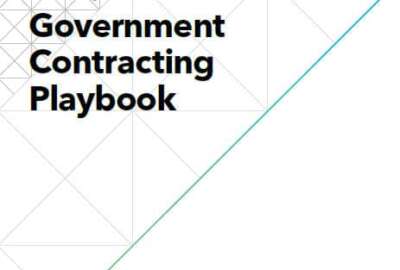 Exclusive
Exclusive  Exclusive
Exclusive George Mason University in Virginia officially launched the Center for Government Contracting to focus on policy, business and regulatory issues that impact the...
Best listening experience is on Chrome, Firefox or Safari. Subscribe to Federal Drive’s daily audio interviews on Apple Podcasts or PodcastOne.
The Kennedy School of Government at Harvard University educates the next generation of federal managers. There are a litany of think tanks and good government groups that focus on big picture issues like foreign policy and government accountability issues.
But there hasn’t been an independent, research-focused organization for government contracting —at least not until now.
George Mason University in Fairfax, Virginia, officially kicked off the Center for Government Contracting to fill an academic and research void. Jerry McGinn, executive director, said the center’s focus is on three broad areas: Education and training, research and collaboration.
“The vision of our center is to be a nexus for government, industry and academia to collaborate on and address issues on government contracting,” McGinn said in an interview with Federal News Network. “We are talking about the business, policy and regulatory issues that animate the $500 billion government contracting ecosystem.”

Other Washington, D.C., area institutions, such as The George Washington University, focus on government contracting legal education and research. American University also has the Key Executive Leadership Program. But before GMU’s School of Business launched the center, industry associations and places like the IBM Center for the Business of Government provided the main outlet for research and education on government contracting issues.
McGinn, who came to GMU after serving as the senior career official in the Office of Manufacturing and Industrial Base Policy at the Defense Department, said the center wants to attract both government and industry acquisition workers and make it easy for them to work in a neutral, third-party setting.
“To the degree there is research in these areas, they are written by a point of view. They are done by or sponsored by a trade association or a company or a government sponsored study, and those are all great, but what we can do longer-form, more seasoned research,” he said. “For instance, one of our faculty just published a study around the growth drivers in the government contracting marketplace. It looked at what really moves the needle on the stock price for publicly traded government contracting companies. That was a 40-page study published in the Journal of Marketing, which was great. But how do we translate that for use by companies in the region and for the government to understand those issues?”
McGinn said he and the study’s author published a column and held an event to help share the research and educate the public. He said this type of approach is how the Center for Government Contracting hopes to bring the federal acquisition community closer together.
“We would love to do some research for the agencies. We have finance professors and can bring in others to help do research as well to help really unpack these issues for the government,” he said. “We can analyze corporate best practices and come up with recommendations to see what would work going forward. That’s a very rich line of effort I want to pursue.”
McGinn said the center is planning research small business contracting, the use of other transaction authorities (OTAs) and intellectual property.
“The goal of research is for George Mason to become the thought leader in the government contracting industry,” he said. “Having a neutral, third-party analyzing these issues is critical because we can help bring those sides together and come up with real solutions. We’ve already published a number of commentary pieces on the shutdown and on innovation. We are doing some long-form research to look at various issues such as what’s a good framework for IP collaboration between government and industry, how do we help small businesses succeed when they graduate from small business programs and are the set-aside programs achieving the government’s objectives? These kind of issues a lot of people have opinions about, but let’s do some fact based research on them.”
 Exclusive
Exclusive Under the education and training line of effort, he said the center plans to develop executive education programs, specifically around using OTAs and how to transition from being a program manager to an executive.
“We are looking to establish a minor in government contracting for our undergraduate business school students. It will help companies in this region have graduates that they know have some understanding of what the Federal Acquisition Regulations is and some basic issues that animate our industry,” McGinn said. “We also are looking to expand our graduate courses in our MBA program as well as our executive MBA program.”
Under the collaboration line of effort, McGinn said he wants the center to bring industry and government together to solve big challenges.
In addition to the three lines of effort, McGinn said the center also will collaborate with the Defense Acquisition University and other federal acquisition training organizations.
“This has become a real industry now. It’s a $500 billion industry that supports all government operations and has a huge impact on our local economy, making up 40 percent of the region’s gross domestic product,” he said. “The more people in companies and government develop and grow in their careers realize they don’t understand the different aspects of this ecosystem. We’d like George Mason to be that place to get training and do events to more fulsomely understand the system we have.”
Copyright © 2025 Federal News Network. All rights reserved. This website is not intended for users located within the European Economic Area.
Jason Miller is executive editor of Federal News Network and directs news coverage on the people, policy and programs of the federal government.
Follow @jmillerWFED
